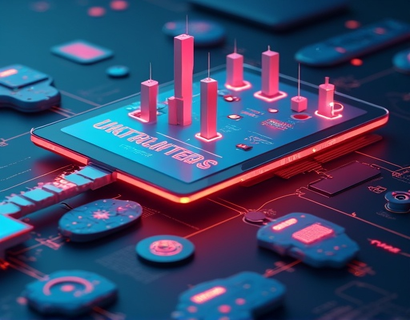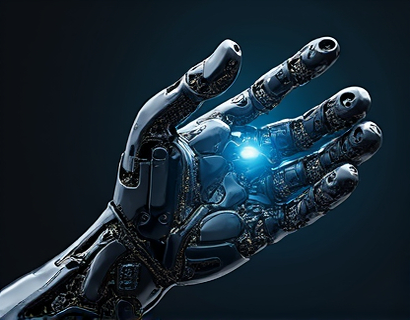Unlocking Enhanced Digital Transformation: The Synergy of AI and Crypto
The intersection of artificial intelligence (AI) and cryptocurrency represents a frontier of digital innovation, offering unprecedented opportunities for tech pioneers and early adopters. This article delves into the advanced integration solutions that harness the power of both technologies to enhance security, efficiency, and innovation. By merging AI with cryptocurrency, we can unlock a new era of digital transformation, elevating online presence and maximizing potential in the rapidly evolving digital world.
Understanding the Basics: AI and Cryptocurrency
Artificial intelligence, defined by its ability to simulate human intelligence processes such as learning and decision-making, has revolutionized various industries. In the context of cryptocurrency, AI plays a pivotal role in enhancing blockchain technology, improving transaction security, and optimizing smart contracts. Cryptocurrency, on the other hand, is a digital or virtual currency that uses cryptography for security, operating on decentralized networks like blockchain. The combination of these two technologies can lead to groundbreaking advancements.
Enhanced Security through AI and Crypto
One of the most significant benefits of integrating AI with cryptocurrency is the enhancement of security measures. Traditional security protocols can be vulnerable to sophisticated cyber attacks. AI algorithms, with their ability to analyze vast amounts of data in real-time, can detect and respond to threats more effectively. For instance, machine learning models can identify unusual patterns in blockchain transactions, flagging potential fraud or hacking attempts before they cause damage. This proactive approach to security ensures that digital assets remain protected, fostering trust and confidence in cryptocurrency systems.
Moreover, AI can improve the security of private keys and wallet management. Advanced biometric authentication methods, powered by AI, can provide a more secure way to access cryptocurrency wallets. Voice recognition, facial recognition, and even behavioral biometrics can be employed to ensure that only authorized users can access sensitive information. This multi-layered security approach significantly reduces the risk of unauthorized access and theft.
Efficiency Gains in Cryptocurrency Transactions
AI can significantly streamline cryptocurrency transactions, making them faster and more efficient. Traditional blockchain networks often face scalability issues, leading to slow transaction times and high fees. AI-driven solutions can optimize blockchain operations by predicting network congestion and dynamically adjusting transaction priorities. This ensures that critical transactions are processed promptly, enhancing the overall user experience.
Smart contracts, self-executing contracts with the terms directly written into code, can also benefit from AI integration. AI can automate the verification and execution of smart contracts, reducing the need for intermediaries and lowering transaction costs. By analyzing historical data and market trends, AI can predict the most optimal times to execute smart contracts, further improving efficiency and reducing risks.
Innovation through AI-Powered Crypto Applications
The synergy of AI and cryptocurrency extends beyond security and efficiency, driving innovation in various applications. Decentralized finance (DeFi) platforms, for example, can leverage AI to create more sophisticated financial products and services. AI algorithms can analyze market data to offer personalized investment advice, automate trading strategies, and manage risk more effectively. This democratizes access to financial services, making them more accessible to a broader audience.
Another area of innovation is in the development of decentralized autonomous organizations (DAOs). AI can enhance the governance and decision-making processes within DAOs by analyzing member preferences and predicting outcomes of proposals. This ensures that decisions are made in the best interest of the community, fostering a more collaborative and efficient organizational structure.
Elevating Online Presence with AI and Crypto
For tech pioneers and early adopters, integrating AI and cryptocurrency can significantly elevate their online presence. Websites and platforms that adopt these technologies can offer a more secure, efficient, and innovative user experience. AI-driven analytics can provide deep insights into user behavior, enabling tailored content and services that resonate more with the audience. This personalized approach can increase user engagement and loyalty, setting these platforms apart in a competitive digital landscape.
Cryptocurrency can also serve as a unique value proposition, offering a decentralized and transparent way to monetize content and services. By accepting cryptocurrency payments, platforms can reduce transaction fees and enhance financial privacy. This can attract users who value decentralization and are looking for alternative economic models.
Maximizing Potential in the Digital World
The integration of AI and cryptocurrency is not just about enhancing existing systems; it's about unlocking new possibilities. For tech pioneers, this means exploring novel applications and business models that leverage the strengths of both technologies. For early adopters, it's an opportunity to be at the forefront of a digital revolution, reaping the benefits of a more secure, efficient, and innovative online environment.
One potential application is in the realm of digital identity. AI-powered identity verification combined with blockchain can create a secure and decentralized identity system. This can simplify online interactions, reduce fraud, and empower individuals with control over their personal data. Such a system can be particularly beneficial in industries like finance, healthcare, and government services, where secure identity verification is crucial.
Another exciting area is in the development of AI-driven virtual assistants and chatbots powered by cryptocurrency. These assistants can offer personalized support, handle transactions, and provide insights based on user preferences and behavior. By using cryptocurrency, these services can operate independently of traditional financial systems, ensuring greater accessibility and inclusivity.
Challenges and Considerations
While the potential benefits are significant, integrating AI and cryptocurrency also comes with challenges. Regulatory uncertainty remains a major concern, as governments worldwide are still grappling with how to regulate these emerging technologies. Tech pioneers and early adopters must stay informed about regulatory developments and ensure compliance to avoid legal issues.
Technical complexity is another factor to consider. Integrating AI and cryptocurrency requires a high level of technical expertise. Organizations and individuals must invest in training and development to build the necessary skills. Collaboration with experts in both fields can help navigate these complexities and ensure successful implementation.
Conclusion
The convergence of AI and cryptocurrency represents a transformative force in the digital world. By enhancing security, efficiency, and innovation, this synergy offers unparalleled opportunities for tech pioneers and early adopters. As we continue to explore and develop advanced integration solutions, the future of digital transformation looks brighter and more promising than ever. Embracing this convergence can position individuals and organizations at the forefront of a new digital era, maximizing their potential in an increasingly interconnected world.










































